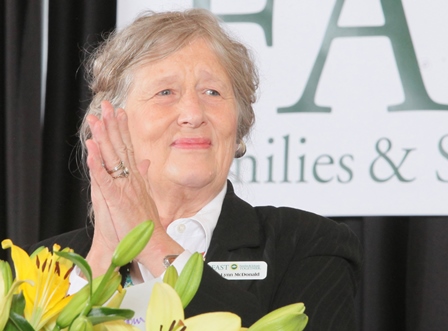On 25th Anniversary, FAST Celebrates International Research
July 25, 2013

FAST founder and WCER researcher Lynn McDonald
Guests came from far and wide to celebrate the FAST program’s 25th anniversary, held as part of the annual conference organized by the non-profit, Families and Schools Together, Inc. in Madison on June 24 and 25.
The FAST program, founded in 1988 by WCER researcher Dr. Lynn McDonald and developed through decades of research conducted at WCER, is a rapidly growing program targeting children’s early socialization and learning skills through family strengthening and parent involvement. FAST brings together multiple families, teachers and community members for eight weekly meetings, during which participants share a meal and participate in structured social activities, including music, family games and sports. FAST has been scientifically proven to reduce behavioral problems in children and improve their academic performance, and WCER recently received a $15 million grant to expand FAST into 60 schools in Philadelphia.
Representatives of many of the 46 U.S. states and 13 countries in which FAST has a presence made the trip to Wisconsin for the conference, which commemorated the advancements – developmental as well as geographic – made by the program. On the second day of the conference, FAST’s international representatives, including FAST facilitators from Canada, the United Kingdom, Scotland, Australia, and The Netherlands, discussed cultural adaptations they had made to the programs in their home countries.
Sixty percent of FAST’s activities are flexible, allowing teams to make changes that they think will improve families’ comfort and retention by adapting to fit local culture of the families being served while still maintaining FAST’s core research-based programming. That flexibility has allowed FAST to spread around the world, according to Carol Goedken, Executive Director and CEO of Families and Schools Together, Inc., the non-profit organization that disseminates FAST.
“The program’s adaptability has made FAST exceptionally well-suited for bridging geographic barriers, and is a large part of what allows us to run programs all over the world,” Goedken said.
At the conference, one after another, each of the international facilitators described how changes they had made to the standard FAST curriculum had contributed to increases in the retention rate of families staying in their programs.
Sherry Hiebert-Keck, from Calgary, Alberta, said she decided to change her program’s song to a tune that would be easier and more familiar for her groups, which include a large number of aboriginal Canadians. She also fine-tuned her group’s programming to be especially attuned to its members’ cultural sensitivities.
In Scotland, Jane Halliday reconfigured FAST’s traditional greeting and nixed sing-along time, as these activities are considered too “Americanized.” Also, instead of creating a family flag, a typical activity in American FAST groups, Halliday had her Scottish participants craft a traditional family clan shield.
“It’s important for us to be allowed to be creative, especially (when it comes to) engaging children,” Halliday said.
In the Netherlands, Erica Bohnen and Kobe Wanningen had to modify their program to adjust to the cultural tendency of Dutch principals and teachers to value the opinions and feelings of children over parents.
“Children are given wide freedoms to be independent in school, which in America would be described as a ‘lack of boundaries,’ and dialogue between schools and parents is often one-way, with parents given much less opportunity to voice their opinions about how the school is run than happens in the U.S.,” Wanningen said.
In the Northern Territory of Australia, where Mal Galbraith runs a FAST program for Australian aboriginals, adjustments had to be made to incorporate the traditional view of family as a larger unit, including grandparents and at times community elders, who he said do a large portion of the parenting. Other changes Galbraith has made to his program include allowing families to sit outside, and to integrate more narrative-based components to conform to aboriginal cultural norms.
“Their culture has been around for 40,000 years,” he said. “We don’t want to come in and implement a different set of values and expectations.”
McDonald, who continues to work with the program along with current WCER-affiliated researcher Adam Gamoran and WCER Outreach Specialist and FAST® Certified Trainer Christopher Daniel, initially opposed any type of change to her carefully crafted program.
“When I started the program 25 years ago, I was totally inflexible – nothing could be changed from the program I developed,” McDonald said. “But people changed things anyway. We would have big meetings and everyone would start talking about all the changes they made. It took a while, but we slowly realized some of them were really good ideas. And then we looked at the data – pre- and post-tests – and saw that even with some of the adaptations that were being made, the program was equally effective.”
Now, McDonald and her collaborators are more open to change, but with one unbending rule – research must prove that they don’t harm the effectiveness of the program.
“We’re always testing to see how much change can happen before the program doesn’t work anymore,” McDonald said. “The key is to have predictable outcomes, and know with certainty that the program will always work. That’s the number one factor that allows us to disseminate it all over the world.”


